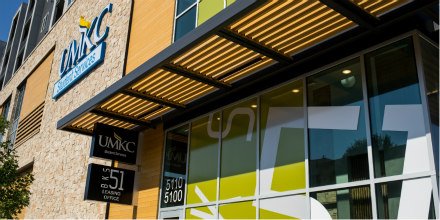UMKC’s Student Government Association (SGA) revamped itself last semester, passing a new constitution, expanding its executive branch and creating its own Supreme Court. With a new look in a new decade, the SGA is setting out ambitious plans to improve campus life.
According to SGA President Justice Horn, the student government’s top priority for its 2020 session is to expand Student Health and Wellness and Counseling Services.
“[Health and Wellness] has been overlooked for far too long, and I believe it’s our duty as SGA to heed the calls of our peers and better the lives of those who attend UMKC,” said Horn.
With Missouri continuing to rank near the bottom nationwide in higher education funding, UMKC’s Student Health and Wellness and Counseling has operated at a deficit, with limited services for years.
This comes at a time when, according to UMKC Chancellor Mauli Agrawal, the demand for counseling services on campus has nearly doubled in the past five years.
Two years ago, the University of Missouri’s SGA and student body passed a campus-wide Health and Wellness Referendum, expanding health resources to all students. Horn’s goal is for UMKC’s SGA to pass a similar piece of legislation this year.
If passed, Horn says such a referendum would lead to an increase in Health and Wellness staff, longer hours, the expansion of counseling services to the Hospital Hill campus, better access to appointments, an on-staff psychiatrist, nutritionist and more.
Although the expansion would likely lead to an increase in tuition, Horn believes that, like the 2019 referendum which increased hours at Miller-Nichols Library, the benefits of such a change would outweigh the costs.
“I hope students trust me and know that I would never put an additional cost on them unless I felt it would truly better them,” Horn said.
The SGA is also working to pass a resolution improving the quality of childcare on campus for students and staff. SGA Senator Trenton Garza said that, though still in its formative stages, the “Joey’s Act” will call for both short and long-term improvements to childcare facilities.
In the short term, the act will call for more changing tables in restrooms on campus, as well as more areas accessible exclusively to nursing mothers.
In the long-term, Garza says the act will urge UMKC administrators to begin the creation of a new on-campus child care facility.
Currently, childcare for UMKC faculty and students is provided at the Edgar L. and Rheta A. Berkley Family Development Center, an early-childhood learning laboratory part of the School of Education.
However, Berkley’s small size (its maximum occupancy for infants, toddlers and pre-K children combined is 100), and a high demand for childcare means the wait-time for students and staff who apply can take years.
Berkley is too expensive for many students as well—charging $1170 a month for infants and $821 monthly for pre-K.
Garza points to other institutions’ childcare programs as examples of how UMKC can improve.
“A number of public universities offer state-funded childcare programs, and given the nature of our university community, our students, staff and faculty could all benefit from such a service,” Garza said.
SGA also worked to bring back the UMKC Sustainability Committee this semester. The committee, present on campus before it dissolved due to budget cuts, joins organizations like Fossil Free UMKC, the Student Environmental Coalition and College Democrats in a growing fight for improved environmental sustainability efforts from UMKC.
“The return of the committee is coming at a time when students overwhelmingly support sustainability efforts,” Horn said. “I heard [students’] calls for the return of this committee, and we did just that.”
Horn points to the fact the Sustainability Committee will be the only campus committee comprised of all three governing entities (SGA, Faculty Senate and Staff Council), as a sign of its strength and potential to enact change.
“Climate change is an existential crisis facing all humankind,” Horn said. “I believe that every action adds up, and I believe that it’s going to take all of us working together to save the planet.”
Instead of selecting an SGA representative to the committee, Horn will appoint two students on campus with a passion for the environment and sustainability efforts.
Other notable SGA plans include expanding the Multicultural Student Affairs Space and Rainbow Lounge, as well as securing funding for the restoration of the UMKC Culture House.
The Student Senate is also drafting a bill that would increase the number of gender-neutral bathrooms on campus.
The lack of state funding for higher education will be a significant obstacle to the SGA accomplishing its biggest goals of expanding on-campus services, but Horn is confident the student government can find success.
“I know this is going to be an uphill battle, and I am ready for that,” Horn said. “Today, the SGA is at the size, influence and strength to properly govern in 2020.”
SGA will hold a town hall meeting on Monday, Feb. 3 at 5 p.m. in the SGA Chambers where students can ask questions and voice concerns they may have. The focus of the event will be counseling services, parking, sustainability and SGA.
lac2m2@mail.umkc.edu








